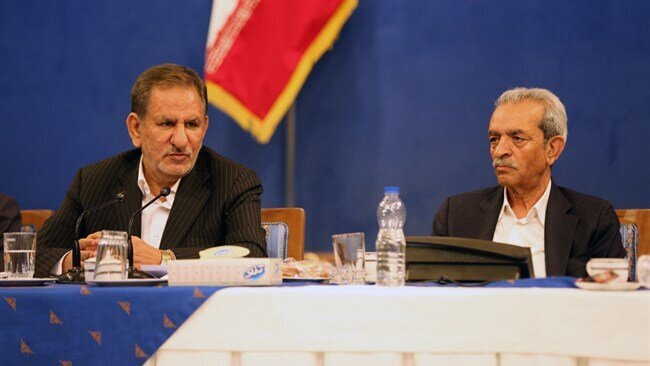
Government needs private sector for national development: VP

He made he remarks in a meeting with the heads of the country’s Chambers of Commerce, Industries, Mines and Agriculture in Tehran on Saturday, for discussing the private sector’s contribution in the economy, the news portal of Iran Chamber of Commerce, Industries, Mines and Agriculture (ICCIMA) reported.
Jahangiri further noted that the government fully supports the private sector, saying “the government should place even more importance on the country’s private sector which is the major driving force behind the economy.”
"Meeting with the representatives of the private sector, who are the pioneers of the country's industry and trade, is a great opportunity for the government to get a better view of the economy and make better planning accordingly," he said.
He stressed the need for the government and the private sector to reach a common understanding of the country’s current economic condition, adding that finding solutions for the problems requires sharing similar views and perspectives on the country's economic situation.
Elsewhere in his remarks, Jahangiri emphasized that the government needs the country's private sector to advance its plans, stating: "currently, over two million job opportunities are created by the private companies, so a significant share of the country's employment is owned by the private sector."
Jahangiri said that the upward trend of the country’s economy and the improvement in non-oil exports and employment indexes are in fact due to the positive performance of the private sector.
“The increase in non-oil exports is a positive move that is due to the efforts of the private sector”, he said.
During the first quarter of this year (March 21-June 20), 6,000 new jobs were created by the private sector compared to the same period in the previous year, the official said.
He finally noted that the country’s banking system has pledged to allocate 9 quadrillion rials (about $214 billion) worth of facilities to the private sector by the end of the current Iranian calendar year (March 19, 2020).
During the meeting, the heads of the provincial chambers of commerce also brought up various issues including the need for using the capacity and experiences of the private sector in government’s economic decision-making, the need for government’s serious support for the private sector, reforming the country’s banking system, amending the tax system, delegating authority to the provinces to resolve their regional problems and creation of a joint cross-border economic task force between the state-run sector and the private sector as well as creation or improvement of the necessary infrastructures for imports and exports.


Trump weighs using $2 billion in CHIPS Act funding for critical minerals

Codelco cuts 2025 copper forecast after El Teniente mine collapse

Electra converts debt, launches $30M raise to jumpstart stalled cobalt refinery

Barrick’s Reko Diq in line for $410M ADB backing

Abcourt readies Sleeping Giant mill to pour first gold since 2014

Nevada army depot to serve as base for first US strategic minerals stockpile

SQM boosts lithium supply plans as prices flick higher

Viridis unveils 200Mt initial reserve for Brazil rare earth project

Tailings could meet much of US critical mineral demand – study

Kyrgyzstan kicks off underground gold mining at Kumtor

Kyrgyzstan kicks off underground gold mining at Kumtor

KoBold Metals granted lithium exploration rights in Congo

Freeport Indonesia to wrap up Gresik plant repairs by early September

Energy Fuels soars on Vulcan Elements partnership

Northern Dynasty sticks to proposal in battle to lift Pebble mine veto

Giustra-backed mining firm teams up with informal miners in Colombia

Critical Metals signs agreement to supply rare earth to US government-funded facility

China extends rare earth controls to imported material

Galan Lithium proceeds with $13M financing for Argentina project

Kyrgyzstan kicks off underground gold mining at Kumtor

Freeport Indonesia to wrap up Gresik plant repairs by early September

Energy Fuels soars on Vulcan Elements partnership

Northern Dynasty sticks to proposal in battle to lift Pebble mine veto

Giustra-backed mining firm teams up with informal miners in Colombia

Critical Metals signs agreement to supply rare earth to US government-funded facility

China extends rare earth controls to imported material

Galan Lithium proceeds with $13M financing for Argentina project

Silver price touches $39 as market weighs rate cut outlook

















